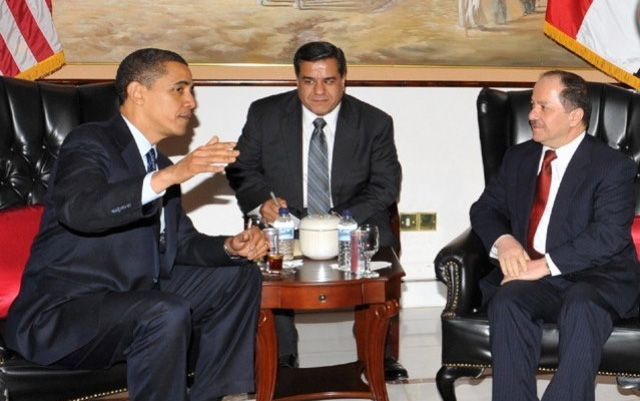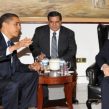
Key to Iraqi Stability Lies in Resolution of the Conflicting Interests of Kurds and Arabs
Publication: Terrorism Monitor Volume: 8 Issue: 8
By:

In his February 2, 2010 “Annual Threat Assessment of the U.S. Intelligence Community,” U.S. Director of National Intelligence Dennis C. Blair predicts that Iraq will continue making progress, although “this forecast is dependent on the next government’s effective management of Arab-Kurd tensions, continued progress in integrating the Sunni Arabs into the political process, and the ability of the ISF [Iraqi Security Forces] to combat threats to the state.” The report adds:
"Arab-Kurd tensions have potential to derail Iraq’s generally positive security trajectory, including triggering conflict among Iraq’s ethno-sectarian groups. Many of the drivers of Arab-Kurd tensions—disputed territories, revenue sharing and control of oil resources, and integration of peshmerga forces—still need to be worked out, and miscalculations or misperceptions on either side risk an inadvertent escalation of violence. U.S. involvement—both diplomatic and military—will remain critical in defusing crises in this sphere. [1]"
U.S. General Raymond Odierno gave a similar assessment in July 2009, telling reporters that, “while violence continues to decline overall, tensions between Iraqi Kurds and Arabs over boundaries and oil revenues represent the biggest threat to the country’s stability” (al-Arabiya, July 29, 2009).
The Uneasy Integration of Kurdish and Arab Security Forces
In 2008 and 2009, Kurdish relations with Baghdad came dangerously close to exploding into open conflict on a number of occasions, as Prime Minister Nuri al-Maliki’s increasingly nationalist stance and advocacy of a strong central government threatened the Kurdish preference for autonomy and decentralization (see Terrorism Focus, February 19, 2009). American intervention and mediation of a number of confrontations, including two incidents where Kurdish peshmerga and Iraqi Army Arab units appeared ready to begin shooting at each other, helped to keep tensions under control. [2] Given that the disputes between Baghdad and Arbil remain unresolved, a looming withdrawal of U.S. forces has increased fears of what may occur in the absence of mediators. In an attempt to foster cooperation and better relations between Kurdish forces and Arab Iraqi Army troops, U.S. forces recently began managing shared checkpoints with both forces along the Kurdish region’s border (AFP, February 11).
The Importance of the Iraqi Consitution
During his January 2010 visit to the United States, Kurdistan Regional Government (KRG) President Massoud Barzani stressed the importance of “strategic long term U.S. engagement with Iraq and the Kurdistan Region” (KRG.org, January 25). In his January 25 meeting with U.S. President Obama, he confirmed the need for Iraq’s constitution to be the arbiter of internal disputes and told U.S. president Barack Obama that Iraqis must implement and abide by all the articles of Iraq’s constitution (KRG.org, January 25).
“Implementing and abiding by all articles of the 2005 Constitution” is the KRG’s way of insisting on three points they consider vital:
• The Kurdish region must have the opportunity to annex some heavily Kurdish and disputed territories south of its current boundaries.
• The KRG must be allowed to sign its own oil contracts and receive a proportional share of national Iraqi oil revenues.
• Kurdistan’s autonomy and Iraq’s highly decentralized federal structure must be maintained."
These three issues lie at the center of unresolved disputes between Arbil and Baghdad.
According to Article 140 of the Constitution, Kirkuk and other disputed territories were to have their demographics “normalized” (meaning the return of mostly Kurdish residents expelled under Ba’athist Arabization campaigns and the departure of Arab settlers), a census was to be conducted in these territories, and Kirkuk and possibly other disputed territories just south of the current KRG borders were to hold a referendum by December 31, 2007 to decide whether to become part of the Kurdistan Autonomous Region. Although normalization has been partially accomplished, parties in Baghdad managed to continually postpone the census and referendum.
The Iraq Constitution likewise grants governorates and autonomous regions all powers which are not explicitly reserved for the federal government in Baghdad. The exploitation of existing oil fields is regarded as a right of the central government, with resulting revenues to be divided proportionally amongst all Iraqis (after deduction of operating expenses and a percentage of revenues for federal projects and expenses). The Kurds, however, claim the right to manage oil fields they discovered or will discover themselves. Although neither Baghdad nor the KRG disputes the principle of sharing oil revenues amongst all Iraqis, management and control of oil production sites in the country offers an important source of power and leverage for both parties. Kurds would especially like such control in order to make sure that Baghdad delivers their promised share of oil revenues. Arab parties in the rest of Iraq, however, want to maintain federal control of the oil industry for both the leverage this will provide them and in order to make sure that the Kurds do not eventually secede, possibly taking oil-rich Kirkuk with them.
Does Decentralization Encourage Separatism?
Most non-Kurdish parties, with the significant exception of the Shi’a Islamic Supreme Council of Iraq (ISCI), fear that the extent of decentralization in the 2005 Constitution increases the chance of Kurdish secession. Kurds in turn insist that such decentralization is precisely what they need to remain within Iraq and serves as the best guarantee against a risky bid for an independent Kurdish state. Massoud Barzani and other leaders have repeatedly warned that a failure to respect the 2005 Constitution will remove any obligation the Kurds may have to remain part of Iraq. “We must understand that everything we accepted was because of the Constitution. When we accepted to remain within Iraq and contribute to the political process, we did that with the view that we will have a constitution” (Massoud Barzani’s interview with Asharq al-Awsat, March 14, 2009).
The Kurds therefore attached great importance to a December 7, 2009 White House statement expressing support for Article 140 of the Iraq Constitution, the article that addresses Kirkuk and other disputed territories. The U.S. statement reaffirmed “its respect for the Iraqi constitution, including Article 140, which addresses the dispute over Kirkuk and other disputed internal borders, and Article 142, which addresses the process for constitutional amendments.” Since Article 142 elaborates the process by which the other elements of the Constitution can be changed, including Article 140 and the various provisions for extensive autonomous Kurdish rights, the American position remained ambiguous. Nuri al-Maliki, most of the Sunni Arab parties and several of the Shi’a Arab blocs would like to utilize Article 142 precisely in order to reverse what they view as excessively “pro-Kurdish” aspects of the Constitution.
Remarks made by U.S. Secretary of Defense Robert Gates—made shortly after the White House statement—appeared to take a less ambiguous and more pro-KRG position. KRG official media reported that during his visit to Arbil, Gates stated that the United States had made three commitments:
• To use our influence to ensure that the outstanding disputes between the KRG and the Iraqi Government, including the Kirkuk dispute and other disputed areas and the sharing of oil revenues, are resolved based on the Iraqi Constitution and Article 140.
• We will continue with our military efforts with the peshmerga forces as well as with the Iraqi Army and security forces within the framework of our joint security architecture.
• We will offer our support and assistance for a census to be conducted in Iraq next year (KRG.org, December 11, 2009).
The statement was quoted only by Kurdish sources and not published by any U.S. government sources. If accurate, it would indicate a more substantive U.S. position on the lingering disputes between the KRG and Baghdad. In addition to supporting the provisions of Article 140, American support for an Iraqi census in 2010 fulfills a long-held Kurdish demand. Such a census will likely show a Kurdish majority in Kirkuk province as well as many of the territories currently disputed between the KRG and Baghdad, which will bolster Kurdish demands to uphold the other key element of Article 140 – referendums to determine if the people of these regions wish to join Kurdistan.
The results of the census will almost certainly be contested, given the grossly varying estimates of the size of Iraq’s ethnic and sectarian groups and the recent disputes over the future allotment of parliamentary seats. While the census will be necessary according to constitutional requirements, it could also lead to more conflict.
Conclusion
Much will also depend on the results of the upcoming March 7 nation-wide elections. Significant divisions have emerged not only between Sunni and Shiite political blocs, but also among the Kurds – with Kurdish Islamist parties as well as the new Gorran Party (a splinter group that broke away from Jalal al-Talabani’s Patriotic Union of Kurdistan) promising to run separately from the previously hegemonic Kurdish List. If more statewide political alliances emerge across sectarian lines after the elections, the dialectic of Kurdish-Arab disputes might recede a little as well. Alternately, Kurdish parties in stiffer competition with each other may feel less able to compromise on core issues like Kirkuk and control of oil resources in Kurdistan.
Notes:
1. Dennis C. Blair, “Annual Threat Assessment of the U.S. Intelligence Community
for the Senate Select Committee on Intelligence,” Office of the Director of National Intelligence, February 2
https://www.dni.gov/testimonies/20100202_testimony.pdf
2. “A Precarious Peace in Northern Iraq,” Middle East Report, October 1, 2009.





